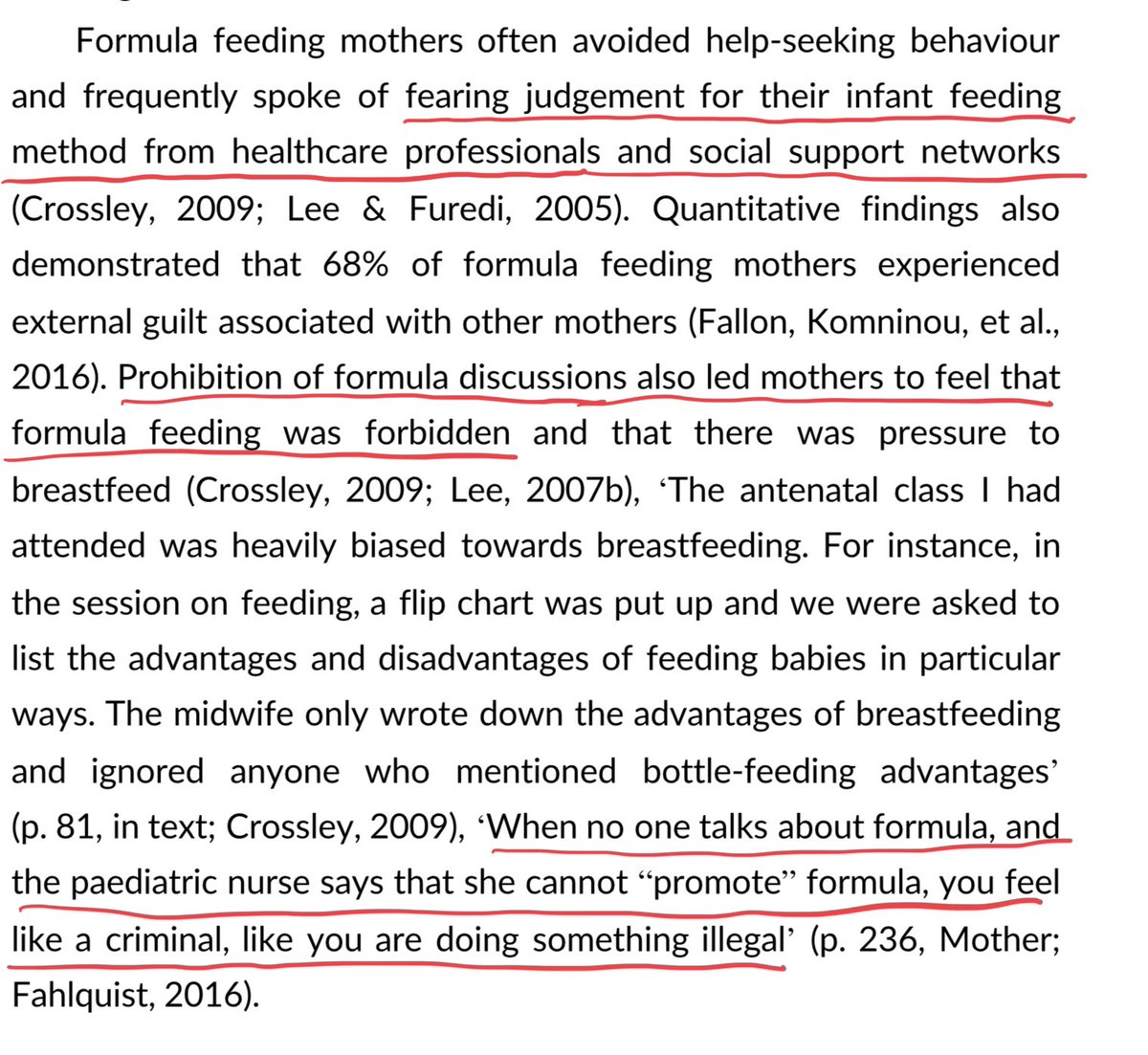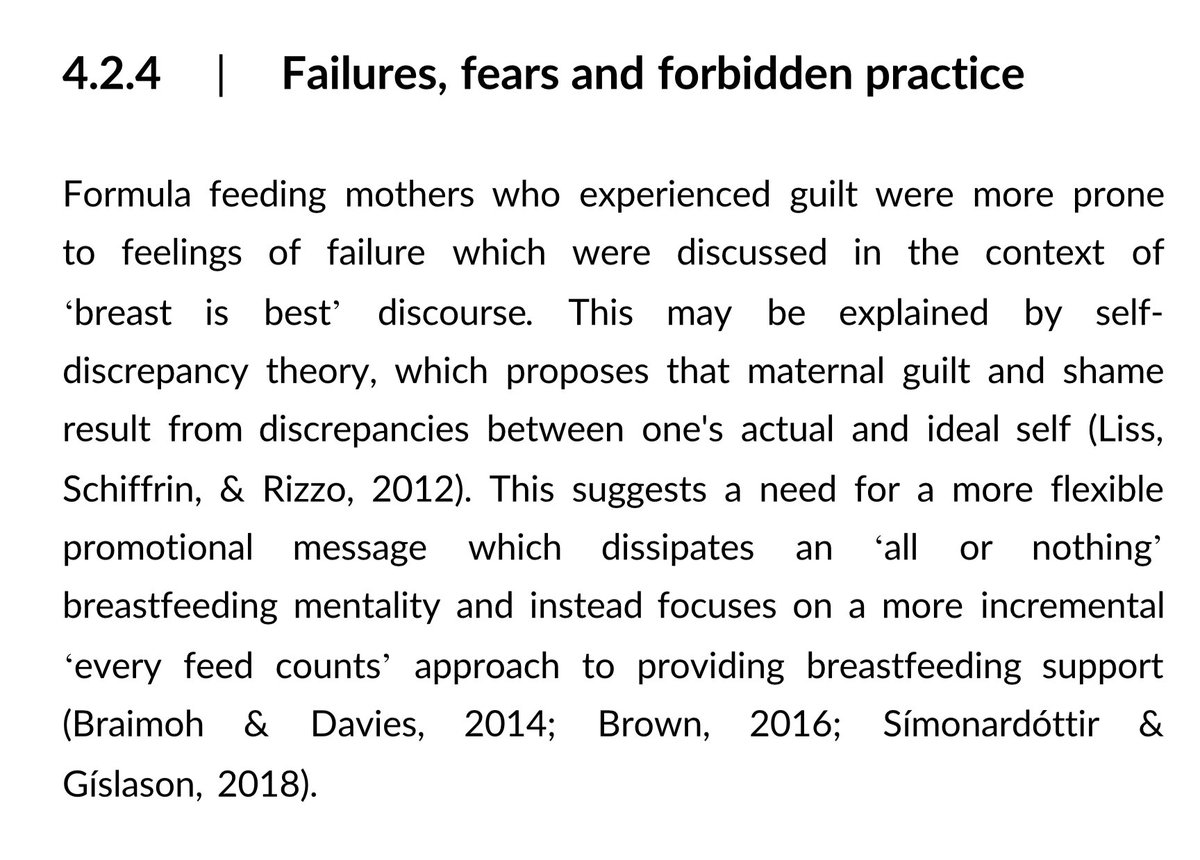Women reported HCPs making them feel guilty (ie. SHAMING THEM) asking if they were still BFing. As a result some women concealed that they were FFing from HCPs. Which leads to the next theme...
2. Failures, fears & forbidden practice
Women felt like failures if they were not BFing. This was asssocated with self-blame. The research suggested that guilt & shame could come from external sources as well as internal feelings
Women felt like failures if they were not BFing. This was asssocated with self-blame. The research suggested that guilt & shame could come from external sources as well as internal feelings
However nobody seems to have stopped to ask from where women have internalised the idea that FFing is bad or that BFing difficulties are their fault or something to be ashamed of. Remarkable given BFing problems and decisions to stop BFing are not unusual
Interestingly, although the literature review searched for the term ‘stigma’ none of the reviewed papers discuss it. But they did identify women fearing judgement, getting the impression that FFing was forbidden or even being made to feel like they were criminals for FFing.
Consider those statements in the light of current policy that maternity services cannot:
-Demo safe formula preparation in groups where women might be intending to BF
-Have info about formula on public display or in public leaflet stands
-Show any images of bottles or teats
-Demo safe formula preparation in groups where women might be intending to BF
-Have info about formula on public display or in public leaflet stands
-Show any images of bottles or teats
If you act like something is a dirty little secret is it such a surprise that people feel a lot of shame for doing it?
They suggest that guilt&shame might contribute to poor ‘BFing outcomes’ but what is a BFing outcome? Is the method the marker of success?
Why aren’t we looking at whether babies’ nutritional needs are being met (ie. not losing excess weight or having faltering growth)
Why aren’t we looking at whether babies’ nutritional needs are being met (ie. not losing excess weight or having faltering growth)
Or infection rates? Or actual health outcomes related to infant feeding? Or whether parents feel feeding is sustaining their family life and isn’t a source of excessive stress?
They suggest that there should be more honesty with parents about BFing difficulties and that strategies should be given to enhance breastfeeding confidence and extend breastfeeding duration.
But...
But...
4 issues:
1. Honesty about BFing problems is non-compliant with current policy (see tweet above)
2. The recent NICE evidence review failed to find any evidence re what might prevent/resolve BF problems so what strategies should be given?
1. Honesty about BFing problems is non-compliant with current policy (see tweet above)
2. The recent NICE evidence review failed to find any evidence re what might prevent/resolve BF problems so what strategies should be given?
3. What makes them think that BF difficulties or decisions to mix feed or stop BFing are confidence issues?
4. Should the goal be to extend BFing duration? Just give us the unvarnished truth in the form of frank, evidence based info that facilitates informed autonomous decisions
4. Should the goal be to extend BFing duration? Just give us the unvarnished truth in the form of frank, evidence based info that facilitates informed autonomous decisions
If you provide info in a manner designed to manipulate peoples’ behaviour, you destroy trust.
HCPs need to TRUST US to make good decisions for our families.
That means we need to know BF problems are common and have realistic expectations about what can be done about them...
HCPs need to TRUST US to make good decisions for our families.
That means we need to know BF problems are common and have realistic expectations about what can be done about them...
And while we are on the subject of presenting info accurately. We need to return to the sacred cow & ask that it be replaced with a realistic estimation of the absolute benefits and risks of all feeding methods with frank acknowledgement of the limits of the current evidence
The authors discuss overinvolved care & non-consensual breast touching and suggest this results from midwives acting as ‘technical experts’ rather than ‘skilled companions’.
We don’t want companions. We want evidence based health care for our infant feeding problems.
We don’t want companions. We want evidence based health care for our infant feeding problems.
And we need to be safe from assault and harassment from HCPs or anyone else providing healthcare support with infant feeding.
The authors suggest resource constraints & work environments are barriers to midwives acting as ‘skilled companions’.
There is not a single mention of the absence of any good evidence for midwives or anyone else to draw on in helping families to prevent or resolve BFing problems
There is not a single mention of the absence of any good evidence for midwives or anyone else to draw on in helping families to prevent or resolve BFing problems
There is one exception here that NICE didn’t pick up on!
There is good evidence that early formula supplementation prevents excessive weight loss & the need for phototherapy for neonatal jaundice in BF babies.
We should be told that too so we can make informed decisions!
There is good evidence that early formula supplementation prevents excessive weight loss & the need for phototherapy for neonatal jaundice in BF babies.
We should be told that too so we can make informed decisions!
The authors suggest that future research should look at the relationship between shame & guilt and infant feeding “outcomes”.
We propose scrutinising current policy and rooting out half truths, misleading statements and anything that causes guilt or shame for families.
We propose scrutinising current policy and rooting out half truths, misleading statements and anything that causes guilt or shame for families.
They propose that while it is important to promote BFing, ppl who FF should get info re how to do it safely.
Is it important to promote BFing? Our bodies, our decisions. Can we just have info that respects our autonomy rather than trying to steer us down a particular path?
Is it important to promote BFing? Our bodies, our decisions. Can we just have info that respects our autonomy rather than trying to steer us down a particular path?
They propose that the all or nothing BFing mentality be changed to a more incremental ‘every feed counts’ approach to BF support.
We think this is a terrible idea and TBH are a bit disappointed that the authors went so far as to recommend this without consulting families...
We think this is a terrible idea and TBH are a bit disappointed that the authors went so far as to recommend this without consulting families...
Here’s why we think it’s a terrible idea:
1. What does the evidence say re how much BFing in terms of the duration or the ration of breastmilk:formula to achieve a meaningful health benefit? (I mean the goal here should be PUBLIC HEALTH OUTCOMES, not changing women’s behaviour)
1. What does the evidence say re how much BFing in terms of the duration or the ration of breastmilk:formula to achieve a meaningful health benefit? (I mean the goal here should be PUBLIC HEALTH OUTCOMES, not changing women’s behaviour)
2. We felt this approach would create huge pressure. Are women with BFing problems to be encouraged to persist with ‘just one more miserable, painful, distressing breastfeed’ because ‘every feed counts’?
What effect would such an approach have on someone expressing for hours every day for a very small volume of milk?

 Read on Twitter
Read on Twitter



